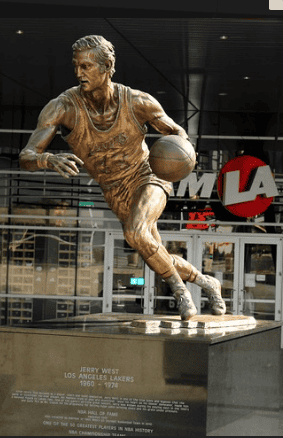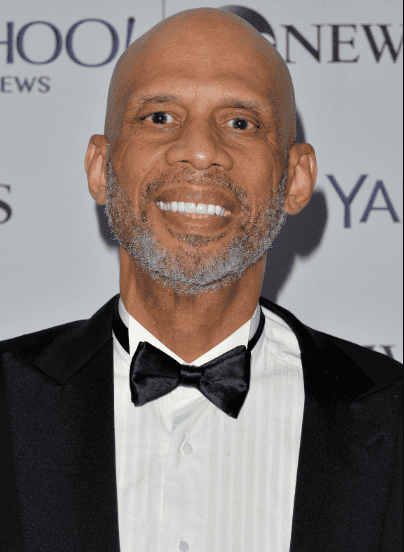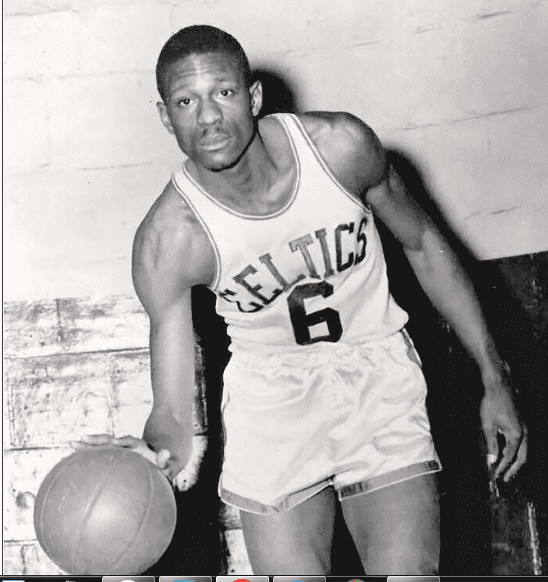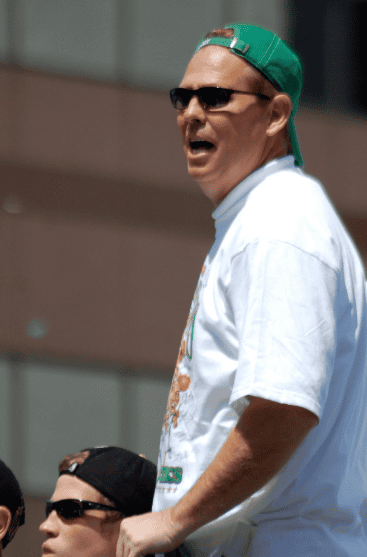In professional basketball, the NBA Finals serve as the ultimate battleground where the finest talents clash to cement their legacies. While success often crowns the victors, for those who have endured multiple defeats in the finals, a different tale unfolds.
In this exploration, we delve into the esteemed players who, despite their unmatched skills, experienced heartrending losses on the grandest stage.
LeBron James – Triumphs and Trials Define His Legacy
LeBron James, a name synonymous with greatness in the basketball world, undoubtedly carved his place in NBA history.
Throughout his illustrious career, the “King” graced the NBA Finals 13 times, a testament to his unparalleled talent and leadership:
- Though his reign led to four NBA championship victories, LeBron also tasted the bitterness of defeat, suffering a total of 33 losses in the finals;
- However, it is vital to remember that LeBron James’ greatness transcends mere numbers on the stat sheet. His unwavering work ethic, versatility, and ability to elevate teams to the pinnacle of honor firmly secure him among the greatest players to ever step onto the court. Each defeat in the Finals only fueled his determination to bounce back, and his resilience in the face of adversity was simply remarkable;
- LeBron James’ journey stands as evidence of the unpredictability of sports and the nuances that separate triumph from defeat. While championships may be the ultimate goal for any player, LeBron’s incredible accomplishments and contributions to the sport continue to inspire generations of basketball enthusiasts worldwide.
As LeBron James continues to pen new chapters in his illustrious tale, one thing remains undeniable: his legacy will forever be defined by the brilliance he displays on the court, leaving an indelible mark that will etch his name into the annals of basketball history.
Jerry West – The Iconic Figure Who Carried the Weight of Final Defeats
Jerry West, affectionately known as “Mr. Clutch,” is a basketball icon whose legacy spans decades. His indomitable spirit and unwavering desire for victory led him to an impressive nine appearances in the NBA Finals. However, fate had a different plan: West endured 33 defeats in the finals, leaving a bright mark on his career.

West’s incredible skills and ability to lead his team in crucial moments earned him respect and admiration from both fans and peers. Despite the heartache of defeats, he never lost his devotion to the sport and his pursuit of excellence. Failures only fueled his determination to come back stronger, showcasing the true spirit of a champion.
Beyond numbers and records, Jerry West’s influence on the game extended far beyond the court. His graceful style of play, unmatched work ethic, and sporting prowess inspired generations of players to strive for greatness.
While the 33 finals losses remain an undeniable part of Jerry West’s legacy, his resilience, skill, and dedication allowed him to become one of the true legends of the game. His journey serves as a reminder that sometimes, even in defeat, the human spirit can shine brightest, leaving an indelible impact on the sport he loved so much.
Kareem Abdul-Jabbar – A Towering Legacy Amidst Finals Trials
Kareem Abdul-Jabbar, a name synonymous with basketball mastery, left an indelible mark on the sport. With an unparalleled skyhook and a celebrated career spanning two decades, he dominated the NBA.

However, amidst his six championship victories, Abdul-Jabbar suffered 27 defeats in the finals, a testament to the unforgiving nature of competition:
- Abdul-Jabbar’s accomplishments as a player who embraced challenges transcended the scoreboard. His graceful presence on the court and unwavering dedication to the game made him an example to emulate for future generations. Despite setbacks, he maintained a stoic resolve and continued to be a driving force for his teams;
- Abdul-Jabbar’s influence extended beyond basketball. His activism, intelligence, and cultural contributions further enriched his legacy. From the basketball court to societal impact, he remains an elevated figure, admired for his resilience and contributions.
The story of Kareem Abdul-Jabbar is a tale of triumphs and trials, reminding us that even amidst defeats in the Finals, true greatness lies in the ability to rise above challenges and leave a legacy that extends beyond the basketball court.
Bill Russell – The Indomitable Competitor Whose Legacy Surpasses Defeat
Bill Russell is one of the greatest figures in basketball history. His 35 appearances in the NBA Finals speak of unparalleled determination, although not all ended in victory.

His record-breaking 11 championship wins immortalized his legacy, proving true greatness goes beyond numbers. As an inspiring leader and defender, he remains an icon revered for his impact both on and off the court.
Danny Ainge – The Tenacious Competitor of the NBA Finals
Danny Ainge, a determined competitor, experienced highs and lows in 21 NBA Finals.

Despite defeats, he maintained resilience and love for the game, proving that the pursuit of greatness is an incredible journey:
- In the NBA, Danny Ainge was known for his tenacity, speed, and ability to play multiple positions. He spent a significant part of his playing career with the Boston Celtics, winning two NBA championships in 1984 and 1986, alongside legendary players like Larry Bird, Kevin McHale, and Robert Parish. Ainge’s knack for making crucial three-pointers and his competitiveness made him a valuable player for the Celtics;
- After retiring as a player, Ainge transitioned to the front office and gained recognition as a successful executive. He held various positions with different NBA teams, including the Phoenix Suns, where he served as head coach, and the Portland Trail Blazers, where he worked as the executive vice president of basketball operations;
- However, it was his return to the Boston Celtics organization that allowed him to truly showcase his leadership skills. In 2003, Ainge became the executive director of basketball operations for the Celtics, and later, in 2006, he was promoted to the position of general manager. Under his guidance, the Celtics made significant moves, including acquiring Kevin Garnett and Ray Allen in 2007, forming the “Big Three” alongside Paul Pierce. This roster change led the Celtics to their 17th NBA championship in 2008.
Throughout his career, both as a player and as an executive, Danny Ainge exemplified a spirit of competition, insightful decision-making, and a deep understanding of the game. He left an indelible mark on basketball, and his contributions are widely recognized by fans and fellow basketball players alike.
Elgin Baylor – The Resilient Warrior
A true game icon, Elgin Baylor reached the NBA Finals eight times during his illustrious career with the Los Angeles Lakers. However, fate seemed relentless in denying him a championship ring. From 1959 to 1969, Baylor’s Lakers fought for a Finals appearance, but each time came up empty-handed.
Despite the emotional turmoil, his unwavering spirit and outstanding performances cemented him as one of the greatest players on the court:
- Throughout his illustrious career, Elgin Baylor was an 11-time NBA All-Star and made the All-NBA First Team 10 times. He repeatedly led the Lakers to playoff victories and Finals appearances, but unfortunately, he never became an NBA champion during his playing career. In several Finals series, he faced the formidable Boston Celtics and, despite his brilliant play, his teams couldn’t secure victory;
- Baylor retired from professional basketball in the 1971-1972 season due to a nagging knee injury. However, his legacy and impact on the game were acknowledged when he was inducted into the Naismith Memorial Basketball Hall of Fame in 1977;
- After his playing career, Elgin Baylor continued to contribute to the development of basketball. He worked as a coach and executive for various NBA teams, including the New Orleans Jazz, Los Angeles Clippers, and Atlanta Hawks;
- Beyond basketball, Baylor’s influence extended to social issues. Throughout his career, he faced racial discrimination and advocated for civil rights, becoming an important figure using his platform to combat social injustice.
The skill, grace, and contribution of Elgin Baylor to the game left an indelible legacy, inspiring not just one generation of basketball players and fans. He will always be remembered as one of the trailblazers who elevated the sport to new heights and helped shape the NBA into what it is today. Elgin Baylor passed away on March 22, 2021, but his memory lives on as a true basketball legend.
Elvin Hayes – The Unsung Hero
Elvin Hayes, often referred to as the “unsung hero,” is a basketball legend who had an outstanding career in the NBA. He was born on November 17, 1945, in Rayville, Louisiana, and became one of the most dominant forwards in basketball history:
- Hayes first caught the public’s attention while attending the University of Houston. From 1967 to 1969, he led the Houston Cougars to three consecutive appearances in the Final Four and became the first player to score over 2,000 points in his college career;
- In the 1968 NBA Draft, Elvin Hayes was selected by the San Diego Rockets (now the Houston Rockets) as the first overall pick. It was in the NBA where Hayes truly shone and established a reputation as a reliable and unstoppable force on the court;
- Standing at 6 feet 9 inches tall, Hayes possessed an array of offensive skills, including his signature turnaround jump shot, which became his trademark move. His tenacity on the boards made him an exceptional rebounder, and he remained a consistent scorer throughout his career;
- In 1972, Elvin Hayes was traded to the Washington Bullets (now the Washington Wizards), and it was with the Bullets that he reached the pinnacle of his career. Hayes formed a formidable frontcourt duo with Wes Unseld, leading the Bullets to the NBA Finals in 1975. In the Finals, the Bullets faced the Golden State Warriors, and Hayes delivered an outstanding performance, earning the NBA Finals MVP award and leading Washington to their first and only NBA championship.
Despite his stellar career, Hayes often found himself overshadowed by some of his contemporaries, such as Kareem Abdul-Jabbar and Wilt Chamberlain. Nevertheless, his consistent excellence and impact on the court are undeniable. Hayes retired as the third-leading scorer in NBA history and remains one of the greatest rebounders in the league’s history.
In 1990, Elvin Hayes was rightfully inducted into the Naismith Memorial Basketball Hall of Fame, a well-deserved recognition of his significant contributions to the sport. After retiring from the sport, he continued to be involved in basketball, working as a television analyst and staying connected to the game.
Beyond basketball, Hayes is remembered as a philanthropist and community activist who used his influence to make a positive impact on society.
Karl Malone – The Mailman’s Missing Package
Karl Malone, widely known as “The Mailman,” is a basketball legend who had a brilliant career in the NBA. Karl Malone was born on July 24, 1963, in Summerfield, Louisiana, and earned his nickname “The Mailman” for always delivering on the basketball court:
- Malone played college basketball at Louisiana Tech University and was selected by the Utah Jazz as the 13th overall pick in the 1985 NBA Draft. He spent the majority of his NBA career with the Utah Jazz, becoming the face of the franchise alongside his longtime teammate, John Stockton;
- Throughout his career, Karl Malone displayed an incredible combination of size, strength, and scoring ability, making him one of the most powerful forwards in NBA history. He was a scoring machine, using his signature move, the turnaround jump shot, with great effect. Additionally, Malone was a formidable rebounder and played with such intensity that he earned respect from both opponents and fans;
- Karl Malone’s partnership with John Stockton in the pick-and-roll was one of the most effective duos in NBA history, leading the Jazz to numerous playoff appearances and two NBA Finals in 1997 and 1998. However, despite his incredible individual success, Malone never won an NBA championship during his career;
- In both NBA Finals, the Jazz faced the formidable Chicago Bulls led by Michael Jordan. Unfortunately, Malone and the Jazz fell short in both Finals series, adding a sense of disappointment to his otherwise illustrious career;
- Throughout his career, Malone achieved significant accolades, including two NBA MVP awards and 11 selections to the All-NBA First Team. Upon retirement, he became the second all-time leading scorer in NBA history, showcasing his incredible consistency and longevity;
- Beyond basketball, Karl Malone is known for his work ethic and dedication to the sport. He was admired for his commitment to physical fitness, allowing him to play at a high level even in the later years of his career.
Although Karl Malone did not become an NBA champion, his contributions to the development of basketball and his impact on the sport are undeniable. He remains one of the greatest players of all time, earning widespread respect for his immense talent, leadership, and competitiveness.
Perhaps the missing championship ring is a blemish on his illustrious career, but Karl Malone’s legacy as “The Mailman” will forever be enshrined in the annals of basketball history.
Wilt Chamberlain – The Dominant Enigma
Wilt Chamberlain, the “dominant enigma,” was a basketball phenomenon whose presence on the court commanded reverence and yet remained mysterious. He was born on August 21, 1936, in Philadelphia, Pennsylvania, and he redefined the way basketball was played:
- Standing at an imposing 7 feet 1 inch and possessing incredible athleticism, Chamberlain was a force like no other. He played college basketball at the University of Kansas and in 1959, he became a player for the Philadelphia Warriors (later known as the Golden State Warriors) when he joined the NBA;
- Chamberlain’s dominance on the basketball court was unparalleled. He was an incredible scorer and led the league in scoring for several seasons. Among his scoring records is the unforgettable game where he scored 100 points in 1962, a unique and unprecedented achievement in NBA history;
- However, Chamberlain’s impact was not limited to scoring alone. He was a dominant rebounder and holds the record for the most rebounds in a single game – an astounding 55. His defensive skills were impressive, making him one of the best shot-blockers in the league. Chamberlain’s athleticism and agility allowed him to excel in various aspects of the game;
- Despite his incredible individual achievements, Chamberlain’s enigmatic nature often raised questions and speculations about his worldview and approach to the game. Some critics doubted his competitiveness, believing that personal accolades were sometimes more important to him than team success. Nevertheless, his records and accomplishments speak to his greatness;
- Wilt Chamberlain’s career was marked by fierce competition with basketball legends such as Bill Russell and Jerry West. In the 1960s, his teams often faced Bill Russell’s Boston Celtics in the NBA Finals, resulting in heartbreaking losses for Chamberlain;
- It wasn’t until 1972, after joining the Los Angeles Lakers, that Chamberlain finally became an NBA champion. Playing alongside Jerry West and Gail Goodrich, he helped the Lakers secure victory in the NBA Finals against the New York Knicks.
Off the court, Wilt Chamberlain’s life was shrouded in secrecy and intrigue. He was known for his colorful personality and various rumors, yet remained a private person, keeping much of his personal life away from prying eyes.
Wilt Chamberlain retired from professional basketball in 1973, leaving behind a legacy that endures to this day. His records and achievements have left an indelible mark on the sport, and he remains one of the most enigmatic and revered figures in basketball history. His dominance on the court and the mystique surrounding his life make him a legend who continues to captivate fans and basketball enthusiasts worldwide.
Conclusions
It’s essential to recognize that while losses in NBA Finals may be a bittersweet reality for some of the greatest players, these setbacks do not define their true greatness. Their resilience, dedication, and contributions to the sport have left an indelible impact on the basketball landscape.
By celebrating their achievements, we remind them that the path to greatness is not without its challenges, and true champions are defined in moments of defeat.
